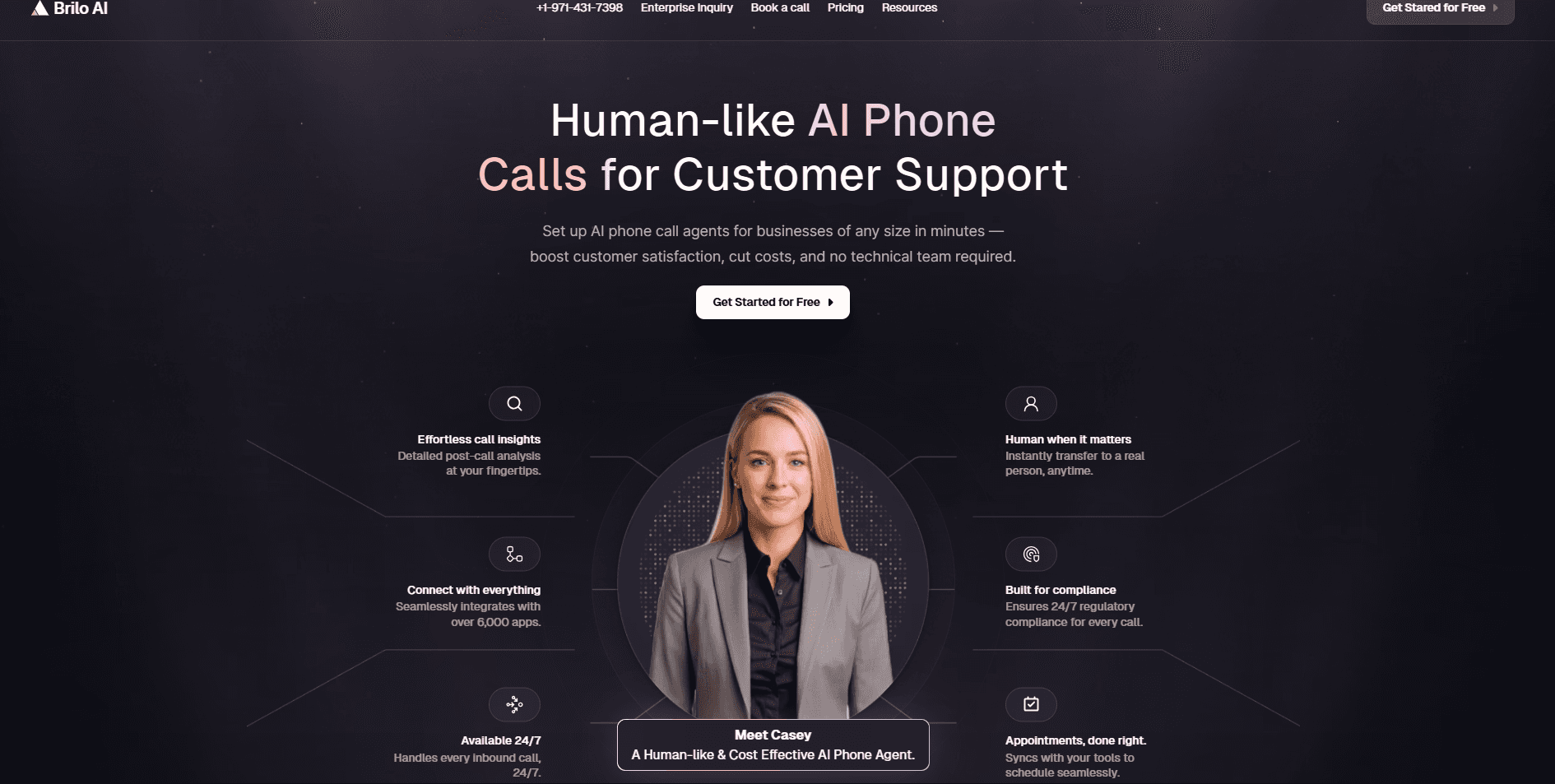

Articles
December 26, 2024
Yatheen Brahma
Ecommerce Customer Service Outsourcing | Complete Guide 2025
Managing customer support effectively can make or break an ecommerce business. Customers expect quick, efficient, and personalized solutions to their concerns. Meeting these expectations during high-demand periods challenges many companies. Scaling support operations, and staying available 24/7 often increase costs and resource strain.
Ecommerce customer service outsourcing addresses these challenges by streamlining operations and providing businesses access to expert support teams and advanced tools like AI. This approach advances efficiency and customer satisfaction while keeping costs in check.
In this blog, we’ll understand the evolution of ecommerce customer service outsourcing, key benefits, the impact of AI, and how businesses can transform customer service for long-term success.
What is Ecommerce Customer Service Outsourcing?
Ecommerce customer service outsourcing refers to delegating customer support tasks to specialized third-party providers. These providers handle critical operations such as addressing customer inquiries, managing returns, processing refunds, and resolving technical issues.
Outsourcing ensures that businesses deliver efficient and timely support without overburdening internal resources. In ecommerce, managing customer service in-house often becomes complex and resource-intensive as businesses scale.
Outsourcing simplifies this process by offering cost-efficient solutions, scalability, and round-the-clock service. Companies benefit from improved customer satisfaction and operational efficiency.
For instance, global brands often partner with the best customer service outsourcing companies for ecommerce stores to ensure seamless support during peak seasons like Black Friday or holiday sales.
Why Outsource Ecommerce Customer Services?
Outsourcing customer service allows ecommerce businesses to focus on growth while ensuring exceptional support. Here are the key benefits of outsourcing your ecommerce customer services:
Cost Efficiency: Outsourcing reduces the need for hiring and training in-house teams, cutting operational expenses. Third-party providers handle repetitive tasks, enabling businesses to allocate resources toward revenue-generating activities without overspending.
Scalability: Outsourced services can adapt to changing customer demands. Providers manage seasonal surges effortlessly, ensuring consistent service quality during high-demand periods, like holiday sales or promotional campaigns.
Access to Expertise: Outsourcing offers access to specialized teams experienced in customer service. These professionals handle complex queries and ensure high-quality support, helping businesses build trust and loyalty with their customers.
24/7 Availability: Outsourced services provide round-the-clock support, ensuring customers receive assistance regardless of time zones. This enhances customer satisfaction and keeps ecommerce operations running smoothly without interruptions.
Enhanced Customer Experience: Providers focus on delivering personalized and efficient support tailored to customer needs. Their expertise in handling queries and complaints improves response times and satisfaction levels, boosting brand loyalty.
How Does Ecommerce Customer Service Outsourcing Work?
Ecommerce customer service outsourcing has evolved significantly over the years. Traditionally, businesses partnered with external agencies like, call centers, to manage support tasks like answering phone calls, and emails, and addressing customer concerns.
Outsourcing firms offered cost-effective solutions by leveraging trained agents located in different parts of the world. This model worked well for handling high volumes but often lacked flexibility and personalization.
The integration of AI has transformed this landscape. Tools like Brilo AI automate essential processes, such as answering repetitive queries, tracking orders, and managing returns, with unparalleled speed and precision. These tools also enable real-time support, ensuring customers receive help anytime.
Businesses integrating AI-powered systems benefit from 24/7 availability and seamless scalability, especially during high-traffic periods like holiday sales. With the rise of AI in customer service it has become more efficient and accessible, providing a competitive edge for businesses.
Key Benefits of AI in Ecommerce Customer Service
AI has revolutionized customer service, making it more efficient, scalable, and personalized. Businesses leveraging AI gain a competitive edge by optimizing operations and enhancing customer satisfaction.
Here are the key advantages of AI in ecommerce customer service:
Cost Savings
AI reduces the financial burden of maintaining large support teams by automating repetitive tasks like order tracking and FAQs. For instance, tools like Brilo AI efficiently handle routine inquiries, minimizing the need for extensive staffing.
Traditional methods often required frequent training and onboarding, further driving costs. By eliminating these expenses, businesses save resources that can be reinvested in growth. Additionally, AI-driven systems reduce manual errors, improving accuracy and boosting overall efficiency.
Scalability
Customer surges during sales periods, such as Black Friday, often overwhelm support systems. AI-powered solutions seamlessly adapt to these peaks, providing consistent service regardless of volume. Traditional setups relied heavily on temporary hires or overtime, which increased costs and stretched resources thin.
AI tools handle fluctuating demand effortlessly, ensuring immediate responses and enhancing customer satisfaction. Scalability through AI allows businesses to grow without compromising service quality, even during high-demand scenarios.
Advanced Customer Experience
Personalized customer interactions are key to fostering loyalty, and AI excels at delivering them. By analyzing past behaviors and preferences, AI tailors responses to individual needs, creating meaningful connections. Traditional methods, constrained by manual processes, often relied on generic replies that felt impersonal.
Advanced tools like Brilo AI incorporate sentiment analysis to understand customer emotions and adjust interactions accordingly. With faster resolutions and thoughtful engagements, businesses using AI see increased satisfaction and stronger relationships.
Real-Time Analytics
Instant access to actionable insights is one of AI’s most valuable contributions. AI-driven tools monitor customer trends, response times, and issue patterns in real-time, helping businesses refine their strategies. Traditional systems often relied on manual data analysis, delaying actionable improvements.
AI tools empower businesses to proactively identify and address pain points, resulting in better service quality. Real-time analytics also facilitate data-driven decision-making, ensuring operations stay aligned with customer needs.
Types of Customer Service Outsourcing for E-commerce
Outsourcing customer service allows ecommerce businesses to offer diverse support channels while maintaining high efficiency and customer satisfaction. AI further enhances these services, making them faster and more cost-effective.
Voice Call Support
Voice calls play an essential role in customer support, particularly in resolving complex issues that require detailed conversations. AI-powered tools like Brilo handle these interactions with precision, using human-like voice technology to enhance communication.
These systems manage high call volumes seamlessly, ensuring minimal wait times and accurate responses to customer queries. AI-powered tools also allow businesses to provide 24/7 support without hiring additional staff, significantly reducing operational costs.
AI-driven voice support also integrates sentiment analysis, identifying customer emotions to adapt responses accordingly. This ensures a personalized experience, helping ecommerce businesses boost satisfaction and maintain customer loyalty even during peak demand.
Chat and Social Media Support
Chat and social media platforms are vital for instant, real-time customer support in today’s ecommerce landscape. AI-powered chatbots deliver immediate assistance, handling inquiries like product questions, order updates, and troubleshooting.
Social media integration allows businesses to engage with customers publicly, managing complaints and fostering positive interactions. Tools like Zendesk provide advanced AI capabilities to prioritize urgent issues while enabling human intervention for more complex queries.
Chat support enhances customer satisfaction by offering fast, personalized resolutions. On social platforms, timely responses build trust and protect brand reputation. Combining these channels ensures round-the-clock accessibility and strengthens overall customer engagement.
Email Support
Email remains a trusted channel for formal communication, particularly for handling detailed or document-heavy inquiries. Outsourcing email support ensures high response quality and quick turnaround times, even during peak periods.
AI tools like Front.ai analyze email content to prioritize urgent cases and provide suggested responses for faster resolutions. These systems also categorize and streamline workflows, improving efficiency across teams. Email support is critical for resolving escalations, processing refunds, and addressing personalized customer requests.
Businesses benefit from consistent communication, reduced manual errors, and enhanced customer trust. By outsourcing email support, ecommerce companies ensure they meet high service standards while reducing operational burdens.
Choose the Best Customer Service Partner for Your Ecommerce Store
Selecting an AI-powered tool for ecommerce customer service outsourcing can significantly enhance efficiency and customer satisfaction. Focus on solutions that offer advanced features designed for the unique needs of ecommerce businesses.
Here are the key features to look for in the best AI tool for your ecommerce customer services:
Technology Capabilities
Advanced AI tools should provide seamless integration with ecommerce platforms, offering features like real-time analytics, omnichannel support, and advanced automation. These technologies reduce response times, streamline workflows, and ensure high-quality customer interactions. Cutting-edge tools enhance operational efficiency, allowing businesses to deliver exceptional support experiences effortlessly.
Pricing and Scalability
An ideal AI tool must balance cost-efficiency with scalability. Flexible pricing models ensure the tool remains within budget while supporting growth. Scalable solutions effortlessly handle seasonal traffic spikes, maintaining consistent service quality. This flexibility ensures businesses can adapt their operations without compromising customer satisfaction during high-demand periods.
Industry Expertise
AI tools designed specifically for ecommerce understand the industry’s unique challenges. Look for tools that address common pain points like order tracking, return management, and customer queries. Tailored solutions improve operational outcomes and customer satisfaction, making them essential for businesses seeking reliable, effective support.
Customer Testimonials
Positive testimonials from ecommerce businesses demonstrate an AI tool’s reliability and effectiveness. Reviews highlight real-world performance and successful implementations, providing confidence in your choice. Tools with proven results ensure businesses achieve their customer service goals while maintaining trust and credibility in the market.
Future Trends in Ecommerce Customer Service Outsourcing
AI is revolutionizing outsourcing ecommerce customer service, delivering smarter, faster, and personalized solutions. Businesses adopting these advancements gain an edge by meeting customer demands efficiently.
Omnichannel Support
Omnichannel support integrates all customer interactions across email, chat, social media, and voice calls. AI-powered platforms ensure seamless transitions, maintaining consistency while resolving queries efficiently. This approach boosts customer satisfaction by providing reliable, unified support experiences across all communication channels.
Predictive Analytics
Predictive analytics leverages historical data to identify customer needs before they arise. AI systems analyze patterns to forecast potential issues and proactively offer solutions. This trend enhances engagement, minimizes resolution times, and allows businesses to deliver preemptive customer care, ensuring a more satisfying experience for ecommerce customers.
Advanced Personalization
AI delivers tailored customer experiences by analyzing behaviors and preferences. Advanced tools like Brilo AI utilize sentiment analysis and intent recognition to personalize interactions effectively. Businesses benefit by building stronger relationships, improving loyalty, and creating impactful, individualized support experiences that meet customer expectations.
Transform Your Ecommerce Customer Service with Brilo AI

Ecommerce customer service outsourcing has redefined how businesses handle customer interactions, making support faster, scalable, and more cost-efficient. AI tools, like Brilo AI, have taken this transformation further by integrating advanced automation, real-time analytics, and human-like interactions.
These tools empower businesses to provide superior customer service effortlessly. Leverage Brilo AI to optimize customer support and stay ahead in the competitive ecommerce landscape.
By embracing innovative solutions, businesses can deliver personalized experiences, improve satisfaction, and handle high-volume demands seamlessly. Explore how Brilo AI can transform ecommerce customer service, ensuring efficiency, growth, and long-term success.
FAQs
What is eCommerce customer service outsourcing?
eCommerce customer service outsourcing involves delegating support operations to third-party providers. This enhances efficiency, reduces costs, and ensures 24/7 availability, allowing businesses to handle customer inquiries, returns, and technical support without overburdening internal teams.
How can AI be used in eCommerce customer service?
AI enhances eCommerce support by automating responses, handling order tracking, and personalizing customer interactions. Top tools like Brilo AI’s voice agents streamline customer inquiries, reduce wait times, and improve overall service efficiency.
What are the benefits of outsourcing eCommerce customer service?
Outsourcing eCommerce customer service reduces costs, improves efficiency, and ensures 24/7 support. Businesses gain scalability, expert assistance, and faster response times, leading to higher customer satisfaction and improved brand loyalty.
How do I choose the right outsourcing partner for eCommerce support?
Selecting an outsourcing partner requires evaluating expertise, scalability, technology integration, and cost-effectiveness. Businesses should prioritize AI-driven solutions, multilingual support, and proven experience to ensure seamless, high-quality customer service operations.
Conclusion
Ecommerce customer service outsourcing in 2025 is transforming how businesses interact with customers. By leveraging solutions like Brilo AI, businesses can enhance support, reduce costs, and improve customer satisfaction.
Outsourcing allows companies to focus on core operations while providing seamless, high-quality service that keeps customers happy and loyal.
Resources
Call automation for ecommerce, healthcare, real estate, logistics, financial services & small businesses.




